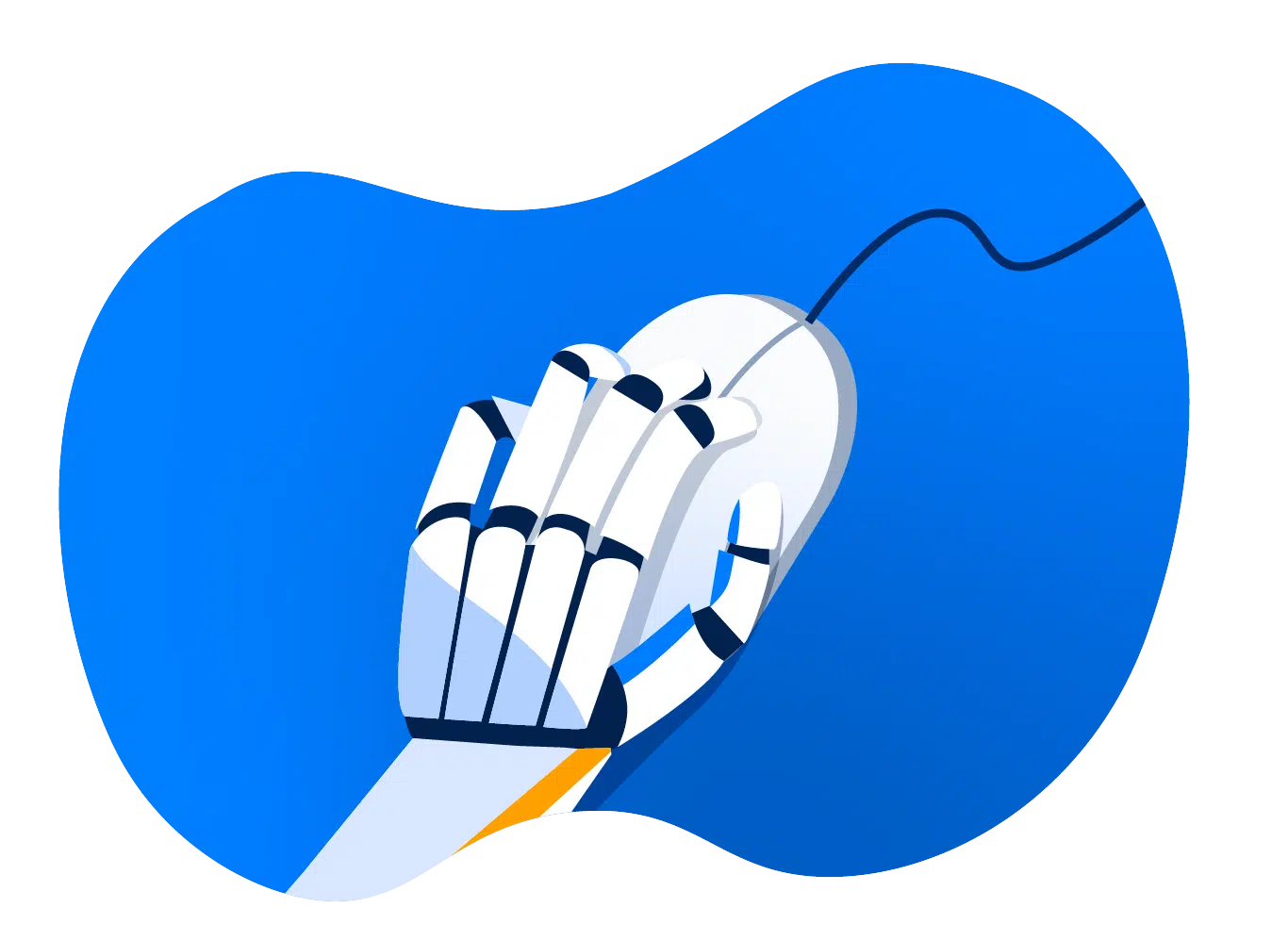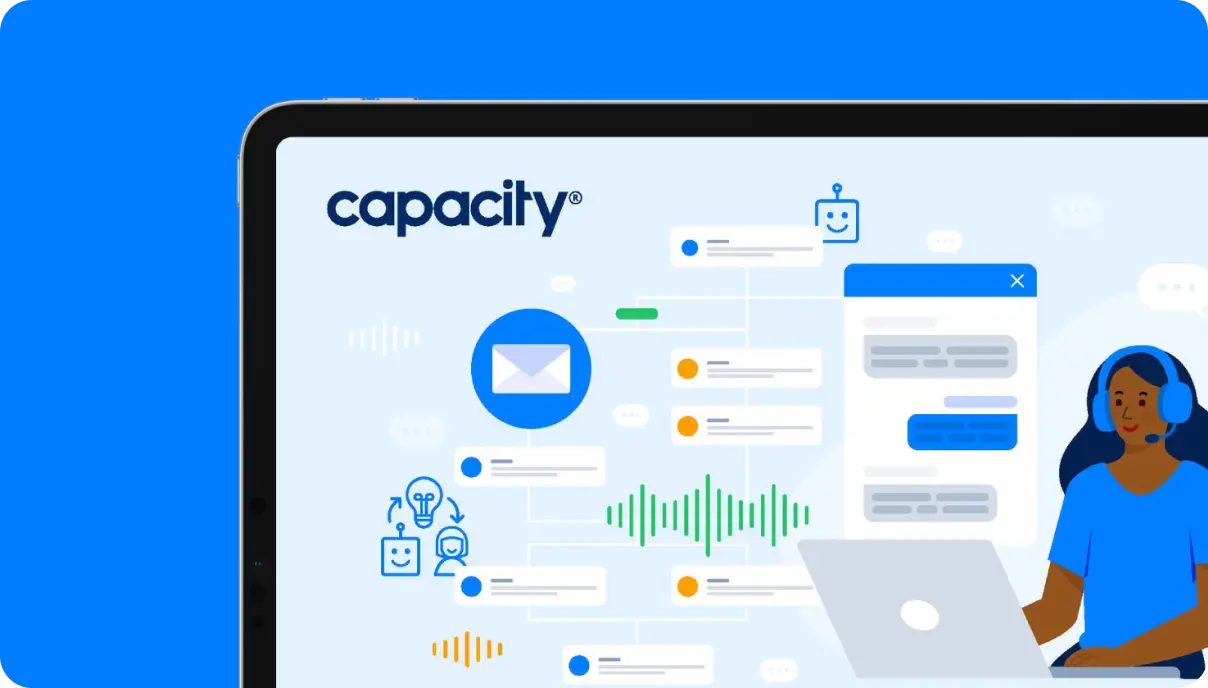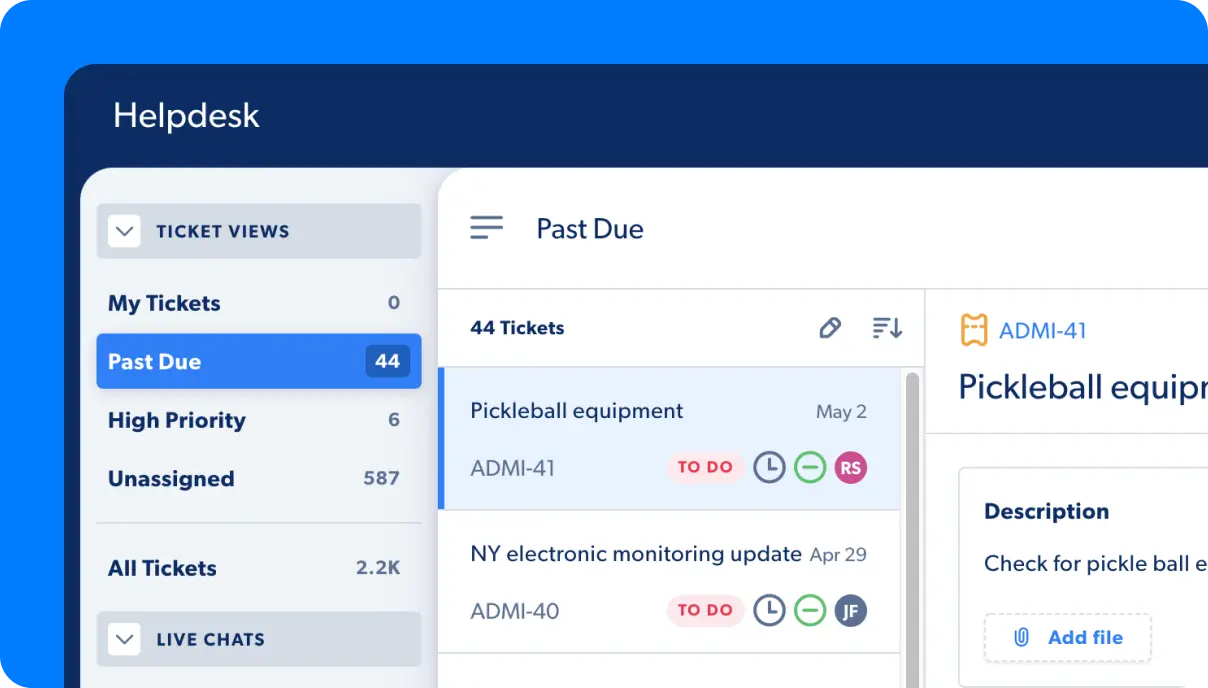As the healthcare landscape rapidly evolves, the pressing need to enhance patient care and satisfaction drives the adoption of cutting-edge technologies. Among these innovations, AI Dr. chatbots stand out as a game-changer in healthcare communication, promising to redefine the patient experience. For healthcare leaders, understanding the potential of AI-powered chatbots is crucial in ensuring that your organization remains at the forefront of this transformative shift.

Automate Your Work
Capacity’s enterprise AI chatbot can help:
- Answer FAQs anytime, anywhere
- Find relevant documents within seconds
- Give surveys and collect feedback
This blog post explores what a Dr. chatbot is, its multifaceted role in healthcare, its remarkable benefits to patients and providers, and how it seamlessly integrates into patient appointment scheduling.
What is a Dr. chatbot?
A Dr. chatbot, or healthcare chatbot, is an AI-driven program designed to interact with patients through various messaging platforms and websites.

A healthcare chatbot comprehends patients’ inquiries using natural language processing (NLP), machine learning algorithms, and deep learning techniques, providing relevant and accurate information in response. NLP allows the chatbot to process and understand human language, facilitating smooth communication. Machine learning enables adaptive learning from patient interactions, improving response accuracy and personalization over time. Deep learning techniques, such as neural networks, contribute to more informed healthcare decisions by processing and analyzing large amounts of data.
Dr. chatbots can assist with scheduling appointments, answering FAQs, providing general medical advice, and guiding patients through healthcare processes. In essence, a Dr. chatbot is a sophisticated AI chatbot that enhances healthcare communication and patient engagement by delivering timely, accurate, and tailored information and support.
The role AI chatbots play in healthcare
AI chatbots play a crucial part in the healthcare sector, revolutionizing the communication and interaction between patients and healthcare providers. These chatbots use NLP and machine learning tools to facilitate a more streamlined and effective healthcare experience.

Here, we explore the multifaceted role of AI chatbots in healthcare:
Round-the-clock patient support
AI chatbots are available 24/7, ensuring patients can access crucial information and support whenever needed. Continuous access to care eliminates patient stress by removing the need to wait until office hours to address their concerns.
Triaging patient inquiries
AI bots can evaluate the urgency of patient inquiries and direct them to the appropriate healthcare professional or department. This triaging capability ensures that patients receive the proper care at the right time, improving the efficiency of the healthcare system.
Enhancing patient education
Dr. chatbots can provide accurate and up-to-date information about various medical conditions, treatment options, and preventive measures. This increased access to information empowers patients to make informed decisions about their health and participate more actively in their care.
Promoting preventive care
Healthcare bots can offer personalized recommendations for preventive care, such as lifestyle changes, exercise routines, or immunizations. These AI bots can aid in the early detection and prevention of chronic illnesses by promoting a proactive approach to healthcare among patients.
Collecting patient feedback
AI chatbots can gather valuable patient feedback on healthcare experiences, helping providers identify areas for improvement and implement data-driven strategies to enhance patient satisfaction.
Streamlining administrative tasks
AI chatbots significantly alleviate the administrative burden of healthcare professionals by automating routine tasks like appointment bookings, prescription renewals, and insurance confirmations. This enables healthcare providers to concentrate on delivering quality patient care.
Top benefits of doctor appointment chatbots

Dr. chatbots provide numerous advantages for both patients and healthcare professionals, such as:
- Efficient appointment scheduling: AI chatbots can manage appointment bookings, cancellations, and rescheduling, reducing the need for staff intervention and making the process more efficient. This efficiency can help healthcare organizations reduce overhead costs associated with appointment management.
- Reduced waiting times: By streamlining the appointment scheduling process, chatbots can help reduce patient waiting times and improve overall satisfaction. Reduced waiting periods improve patient experience and increase patient loyalty, ultimately benefiting the healthcare provider.
- Better patient support: They can provide real-time patient support, answering their questions and guiding their healthcare journey. This support can help patients feel more confident in their healthcare decisions and foster stronger patient-provider relationships.
- Enhanced patient-provider communication: By offering an easily accessible communication channel, Dr. chatbots can improve patient-provider communication, leading to better patient outcomes. Improved communication can help healthcare providers better understand their patient’s needs and concerns, ultimately leading to more personalized and effective care.
How AI chatbots can schedule patient appointments

AI chatbots can streamline the patient appointment scheduling process in several ways:
Conversational interface
Patients can interact with the chatbot through a user-friendly, conversational interface, providing their preferred dates, times, and doctor preferences. By providing a user-friendly interface, the appointment scheduling experience becomes more positive and less daunting for patients, inspiring them to participate more actively in their healthcare.
Automatic appointment booking
The chatbot can automatically book appointments based on the patient’s preferences and the healthcare provider’s availability, sending confirmation messages to the patient. This automation can help reduce the likelihood of scheduling errors and improve the overall efficiency of the appointment booking process.
Appointment reminders
Dr. chatbots can dispatch appointment reminders to patients, effectively decreasing the chances of patients failing to attend their scheduled appointments. These reminders can be sent through various channels, such as text messages, emails, or in-app notifications, making it more convenient for patients to stay on top of their healthcare commitments.
Easy rescheduling
If a patient needs to reschedule their appointment, the chatbot can facilitate this process, finding a suitable alternative appointment slot. Including this feature can alleviate the annoyance and inconvenience of rescheduling appointments and guarantee that patients receive proper care in a timely fashion.
Integration with electronic health records (EHRs)
AI chatbots can be integrated with EHR systems to access patient information and provide more personalized appointment scheduling assistance. This integration can help healthcare providers maintain a more accurate and up-to-date record of patient appointments, leading to better overall care.

Automate Your Work
Capacity’s enterprise AI chatbot can help:
- Answer FAQs anytime, anywhere
- Find relevant documents within seconds
- Give surveys and collect feedback
Overcoming challenges in implementing Dr. chatbot
While the benefits of healthcare chatbots are undeniable, healthcare organizations may face challenges in implementing these AI-powered tools. Some of these challenges include:
Data privacy and security: Ensuring that patient data remains secure and confidential is a top priority for healthcare organizations. When implementing AI chatbots, choosing a solution that complies with data protection regulations, such as HIPAA in the United States, and employs robust security measures to safeguard patient information is essential.
Integration with existing systems: Integrating Dr. Chatbot with existing healthcare systems and workflows can be a complex process. Healthcare organizations should collaborate closely with chatbot providers for smooth integration and to avoid disruptions to existing operations.
User adoption: For Dr. Chatbot to be effective, patients and healthcare providers must be willing to use the technology. Healthcare organizations should provide training and support to help users become comfortable with the new system and regularly collect feedback to identify areas for improvement.
Maintaining the human touch: While AI chatbots can significantly improve efficiency and communication, it’s important not to lose the human touch in healthcare interactions. Healthcare providers should ensure that patients can speak with a human representative when needed and strike a balance between automation and human interaction.
Final thoughts
In conclusion, the integration of Dr. chatbots in healthcare communication holds the potential to revolutionize patient care and satisfaction. While the benefits are apparent, it is crucial to consider the balance between AI-driven assistance and human interaction in the healthcare experience. Exploring solutions like Capacity, an AI-powered support automation platform that can seamlessly complement healthcare chatbots, is essential.
By integrating a comprehensive AI-powered platform like Capacity with Dr. chatbots, healthcare organizations can harness the best of both worlds: AI-driven efficiency and human expertise. Ultimately, the key to maximizing patient satisfaction is using innovative solutions like healthcare chatbots and Capacity while maintaining the human element at the heart of healthcare.













































